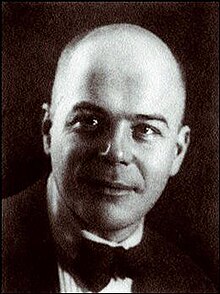Viktor Shklovsky | |
|---|---|
 | |
| Born | Viktor Borisovich Shklovsky 24 January [O.S. 12 January] 1893 |
| Died | 6 December 1984 (aged 91) |
| Alma mater | Saint Petersburg Imperial University |
| Notable work | Воскрешение слова (1914) Art as Device (1917) Zoo, or Letters Not About Love (1923) Theory of Prose (1925) |
| School | Russian Formalism |
Main interests | Literary theory Literary criticism |
Notable ideas | Ostranenie (1917) |
Viktor Borisovich Shklovsky[1] (Russian: Ви́ктор Бори́сович Шкло́вский, IPA: [ˈʂklofskʲɪj]; 24 January [O.S. 12 January] 1893 – 6 December 1984) was a Russian and Soviet literary theorist, critic, writer, and pamphleteer.[2] He is one of the major figures associated with Russian formalism.
Viktor Shklovsky's Theory of Prose was published in 1925.[3] Shklovsky himself is still praised as "one of the most important literary and cultural theorists of the twentieth century"[4] (Modern Language Association Prize Committee); "one of the most lively and irreverent minds of the last century"[5] (David Bellos); "one of the most fascinating figures of Russian cultural life in the twentieth century"[6] (Tzvetan Todorov)
- ^ Also transliterated Shklovskii.
- ^ Peter Rollberg (2016). Historical Dictionary of Russian and Soviet Cinema. US: Rowman & Littlefield. pp. 670–671. ISBN 978-1442268425.
- ^ Shklovsky, Viktor; Sher, Benjamin; Bruns, Gerald (1 April 1993). Theory of Prose. Elmwood Park, Ill: Dalkey Archive Press. ISBN 9780916583644.
- ^ "Announcing MLA award winners: Ecocriticism and Italy and Viktor Shklovsky: A Reader - Bloomsbury Literary Studies Blog". Bloomsbury Literary Studies Blog. 11 December 2017. Retrieved 16 October 2018.
- ^ Bloomsbury.com. "Viktor Shklovsky". Bloomsbury Publishing. Retrieved 16 October 2018.
- ^ Bloomsbury.com. "Viktor Shklovsky". Bloomsbury Publishing. Retrieved 16 October 2018.